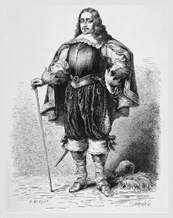The Good, the Bad and the Unready (53 page)
Read The Good, the Bad and the Unready Online
Authors: Robert Easton

 Philip the
Philip the
Prudent
Philip II, king of Spain, 1527–98
Philip’s contemporaries used such terms as ‘melancholy’ and ‘phlegmatic’ to describe this king, who seldom revealed his emotions. Certainly, he never acted in haste – indeed he was notoriously tardy in making decisions. According to his court secretary Cabrera de Cordoba, he would infuriate his ministers with his catchphrase of ‘I and time shall arrange matters as we can’, and by holding on to important papers ‘until they wilted’.
Scholars disagree as to his political prudence. Some consider his quiet reserve to be nothing more than timidity and lack of resolve. Others see it as good common sense. Certainly his prudence appears to have failed him when he sent his armada against
GOOD QUEEN BESS
in 1588: it was soundly defeated and then shattered to smithereens by storms.
 Puddle-Nell
Puddle-Nell
see
Eleanor the
WITTY
 Louis the
Louis the
Quarreller
Louis X, king of France, 1289–1316
Louis quarrelled a lot, especially with his advisers. Once he lashed out at some of them when they suggested that he should not indulge in cold wine immediately after an overheated ball game – a practice, perhaps, that may have led to his death from pleurisy while still in his twenties. Louis was also known as ‘le Hutin’, sometimes translated as ‘the Stubborn’. The
hutinet
was a small mallet used by coopers that made a magnificent bonging noise but did not give very forcible blows. Some have suggested that this second epithet therefore refers not to any character trait but rather to a brief reign that was busy yet lacked any significant impact.
 Queen Dick
Queen Dick
Richard Cromwell, English statesman, 1626–1712
Oliver
‘NOSE ALMIGHTY’
Cromwell was particularly concerned with the welfare of his son Richard, known as Dick, whom he suspected of being something of a weak vessel. To this end he undertook some matchmaking and negotiated a union between Dick and one Dorothy Mayor (whom Cromwell senior called ‘Doll’).

Queen Dick
Dick was a sweet and oversensitive young man, and the contemporary verdict on him was that he as an amiable, if spineless, individual. In middle age Dick was still the same genial but incompetent country gentleman. His brother-in-law, Viscount Fauconberg, used a genteel, biblical turn of phrase when he wrote of Dick’s fine qualities ‘even if his sheaf be not as Joseph’s, to which all the rest bow’. Others were less polite, going so far as to question whether Oliver, the great military leader, could really be the father of such a loveable nincompoop. His nickname ‘Queen Dick’ and the contemporary phrase ‘as queer as Dick’s hatband’ allude to a widespread suspicion that Richard Cromwell was homosexual.
 Queen Goosefoot
Queen Goosefoot
see
Bertha
BIGFOOT
 Diana the
Diana the
Queen of Hearts
see
Diana the
PEOPLE’S PRINCESS
 Elizabeth the
Elizabeth the
Queen of Hearts
see
the
WINTER MONARCHS
 Mary the
Mary the
Queen of Tears
Mary, second wife of King James II of England, 1658–1718
Mary of Modena had cause to weep. Between 1675 and 1682 she gave birth to five children, all of whom quickly died, with the blame popularly being conferred upon her husband, ‘James the Popish Duke’ (
see
the Popish and Protestant Dukes), who had regularly suffered from venereal disease. In 1688 she finally gave birth to her sixth child, a healthy boy. Any royal aspirations she may have held for him, however, were soon dashed as a cynical nation, calculating that he had been born a month prematurely, presumed that he was not hers at all but had been substituted for yet another stillborn child in order to preserve the
Catholic succession. This rampant suspicion led to the invasion of William III, ‘the Gallic Bully’. Mary, with James the
WARMING-PAN BABY
in her arms, tearfully escaped to a life of exile in France.
 Zenobia the
Zenobia the
Queen of the East